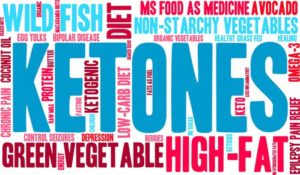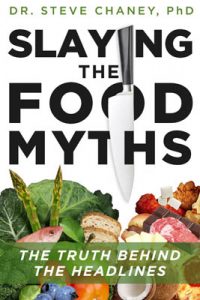What Does A Heart Healthy Diet Look Like?
Author: Dr. Stephen Chaney
 Heart disease is a big deal. According to the CDC, “Heart disease is the leading cause of death for men, women, and people of most racial and ethnic groups in the United States. One person dies every 33 seconds in the United States from cardiovascular disease. About 695,000 people in the United States died from heart disease in 2021 – that’s 1 in every 5 deaths”.
Heart disease is a big deal. According to the CDC, “Heart disease is the leading cause of death for men, women, and people of most racial and ethnic groups in the United States. One person dies every 33 seconds in the United States from cardiovascular disease. About 695,000 people in the United States died from heart disease in 2021 – that’s 1 in every 5 deaths”.
This doesn’t have to happen. According to the Cleveland Clinic, “90 percent of heart disease is preventable through healthier diet, regular exercise, and not smoking”. For this issue of “Health Tips From the Professor”, I will focus on the role of diet on heart health.
The problem is many Americans are confused. They don’t know what a heart-healthy diet is. There is so much conflicting information on the internet.
Fortunately, the American Heart Association has stepped in to clear up the confusion.
In 2021 they reviewed hundreds of clinical studies and published “Evidence-Based Dietary Guidance to Promote Cardiovascular Health”.
And recently they have published a comprehensive review (CD Gardner et al, Circulation, 147: 1715-1730, 2023) of how well popular diets align with their 2021 dietary guidelines.
I will cover both publications below. But first I want to address why Americans are so confused about which diets reduce heart disease risk.
Why Are Americans Confused About Diet And Heart Disease Risk?
 I should start by addressing the “elephant in the room”.
I should start by addressing the “elephant in the room”.
- As I discussed in last week’s “Health Tips From the Professor” article, Big Food Inc has seduced us. They have developed an unending supply of highly processed foods that are cheap, convenient, easy to prepare, and fulfill all our cravings. These foods are not heart-healthy, but they make up 73% of our food supply.
The Institute of Medicine, the scientific body that sets dietary standards, states that a wide range of macronutrient intakes are consistent with healthy diets. Specifically, they recommend carbohydrate intake at 45% to 65%, fat intake at 20% to 35%, and protein intake at 10% to 35% of total calories. (Of course, they are referring to healthy carbohydrates, fats, and proteins.)
The authors of this article pointed to several reasons why Americans have been misled about heart-healthy diets.
- Many of the most popular diets fall outside of the “Acceptable Macronutrient Range”.
- Many popular diets exclude heart-healthy food groups.
And, the words of the authors,
- “Further contributing to consumer misunderstanding is the proliferation of diet books, [and] blogs [by] clinicians with limited understanding of what the dietary patterns entail and the evidence base for promoting cardiometabolic health.” I call these the Dr. Strangeloves of our world.
What Does A Heart Healthy Diet Look Like?
Let me start by sharing the American Heart Association’s 10 “Evidence-Based Dietary Guidelines to Promote Cardiovascular Health.
| #1: Adjust energy intake and expenditure to achieve and maintain a healthy body weight | |
| #2: Eat plenty of vegetables and fruits; choose a wide variety | |
| #3: Choose foods made mostly with whole grains rather than refined grains | |
| #4: Choose healthy sources of protein | |
| Mostly from plants (beans, other legumes, and nuts) | |
| Fish and seafood | |
| Low-fat or fat-free dairy products instead of full-fat dairy products | |
| If meat or poultry are desired, choose lean cuts and avoid processed forms | |
| #5. Use liquid plant oils (olive, safflower, corn) rather than animal fats (butter and lard) and tropical oils (coconut and palm kernel) | |
| #6. Use minimally processed foods instead of highly processed foods | |
| #7: Minimize intake of beverages and foods with added sugars | |
| #8: Choose and prepare foods with little or no salt | |
| #9: If you do not drink alcohol, do not start; if you choose to drink alcohol, limit intake | |
| #10: Adhere to this guidance regardless of where food is prepared or consumed | |
Here are my comments on these guidelines:
- If you have been reading my “Health Tips From the Professor” blog for a while, you probably realize that these aren’t just guidelines to promote heart health. These guidelines also reduce the risk of diabetes, cancer, inflammatory diseases, and much more.
- If you have read my post on coconut oil, you will know that I have a minor disagreement with the AHA recommendation to avoid it. There is no long-term evidence that coconut oil is bad for the heart. But there is also no long-term evidence that it is good for the heart. My recommendation is to use it sparingly.
- And you probably know there has been considerable discussion recently about whether full fat dairy is actually bad for the heart. In my most recent review of the topic, I concluded that if full fat dairy is heart healthy, it is only in the context of a primarily plant-based diet and may only be true for fermented dairy foods like unpasteurized yogurt and kefir.
- Finally, guideline 10 may need some translation. Basically, this guideline is just asking how easy it is to follow the diet when you are away from home.
Which Diets Are Heart Healthy?
 In evaluating how well diets adhered to the American Heart Association guidelines the authors ignored item 1 (energy intake) because most of the diets they evaluated did not provide any guidelines on how many calories should be consumed.
In evaluating how well diets adhered to the American Heart Association guidelines the authors ignored item 1 (energy intake) because most of the diets they evaluated did not provide any guidelines on how many calories should be consumed.
Each diet was given a score between 0 (Fail) and 1 (A+) for each of the other 9 guidelines by a panel of experts. The points for all 9 guidelines were added up, giving each diet a rating of 0 (worst) to 9 (best). Finally, a score of 9 was assigned 100%, so each diet could be given a percentage score for adherence to heart-healthy guidelines.
Here are the results:
Tier 1 diets (the most heart healthy diets) received scores of 86% to 100%. Going from highest (100%) to lowest (86%), these diets were:
- DASH, Nordic, Mediterranean, Pescetarian (vegetarian diets that allow fish), and Ovo-Lacto Vegetarian (vegetarian diets that allow dairy, eggs, or both).
- You will notice that these are all primarily plant-based diets.
Tier 2 diets were Vegan and other low-fat diets (TLC, Volumetrics). They both received scores of 78%.
- The Vegan diet received 0 points for category 10 (ease of following the diet when eating out). It was also downgraded in category 7 for not having clear guidance for the use of salt when preparing foods.
- The other low-fat diets were downgraded in categories 7, 10, and 5 (use of tropical oils).
Tier 3 diets received scores of 64% to 72%. They included very-low fat diets (<10% fat, very strict vegan diets) and low-carb diets (Zone, South Beach, Low-Glycemic Index).
- They received 0 points for category 10 and were downgraded for eliminating heart-healthy food groups (liquid plant oils for the very low-fat diets, and fruits, vegetables, whole grains, and plant proteins for the low-carb diets).
Tier 4 diets (the least heart healthy diets) were the Paleo diet with a score of 53% and very low-carb diets (Atkins and Ketogenic) with a score of 31%.
- The Paleo diet received 0 points for categories 10, 3 (choose whole grains), and 5 (using liquid plant oils rather than animal fats or tropical oils). It was also downgraded for lack of healthy plant-based protein sources.
- The very low-carb diets were the least heart healthy. They received 0 points for categories 2 (eat plenty of fruits and vegetables), 3 (choose whole grains), 3 (healthy protein sources), 5 (use liquid plant oils instead of animal fats), 7 (minimize salt consumption), and 10 (ease of following the diet away from home).
The authors concluded, “Numerous [dietary] patterns [are] strongly aligned with 2021 American Heart Association Dietary Guidance (ie, Mediterranean, DASH, pescetarian, vegetarian) [and] can be adopted to reflect personal and cultural preferences and budgetary constraints.
Thus, optimal cardiovascular health would be best supported by developing a food environment that supports adherence to these patterns wherever food is prepared or consumed.”
Given our current food environment that last statement is wildly optimistic. But at least you have the information needed to make the best food choices for you and your family
The Bottom Line
In 2021 the American Heart Association published 10 guidelines for evaluating heart-healthy diets. A recent study looked at how well popular diets adhered to those guidelines. The authors separated the diets into four categories (tiers) based on how heart-healthy they were. The results were not surprising:
- Tier 1 diets (the most heart healthy diets) were DASH, Nordic, Mediterranean, Pescetarian (vegetarian diets that allow fish), and Ovo-Lacto Vegetarian (vegetarian diets that allow dairy, eggs, or both).
- Tier 2 diets were Vegan and other low-fat diets (TLC, Volumetrics).
- Tier 3 diets included very-low fat diets (<10% fat, very strict vegan diets) and low-carb diets (Zone, South Beach, Low-Glycemic Index).
- Tier 4 diets (the least heart healthy diets) were the Paleo diet and very low-carb diets (Atkins and Ketogenic).
The authors concluded, “Numerous [dietary] patterns [are] strongly aligned with 2021 American Heart Association Dietary Guidance (ie, Mediterranean, DASH, pescetarian, vegetarian) [and] can be adopted to reflect personal and cultural preferences and budgetary constraints.
Thus, optimal cardiovascular health would be best supported by developing a food environment that supports adherence to these patterns wherever food is prepared or consumed.”
Given our current food environment that last statement is wildly optimistic. But at least you have the information needed to make the best food choices for you and your family.
For more information on this study, read the article above.
These statements have not been evaluated by the Food and Drug Administration. This information is not intended to diagnose, treat, cure, or prevent any disease.
____________________________________________________________________________
My posts and “Health Tips From the Professor” articles carefully avoid claims about any brand of supplement or manufacturer of supplements. However, I am often asked by representatives of supplement companies if they can share them with their customers.
My answer is, “Yes, as long as you share only the article without any additions or alterations. In particular, you should avoid adding any mention of your company or your company’s products. If you were to do that, you could be making what the FTC and FDA consider a “misleading health claim” that could result in legal action against you and the company you represent.
For more detail about FTC regulations for health claims, see this link.
https://www.ftc.gov/business-guidance/resources/health-products-compliance-guidance














